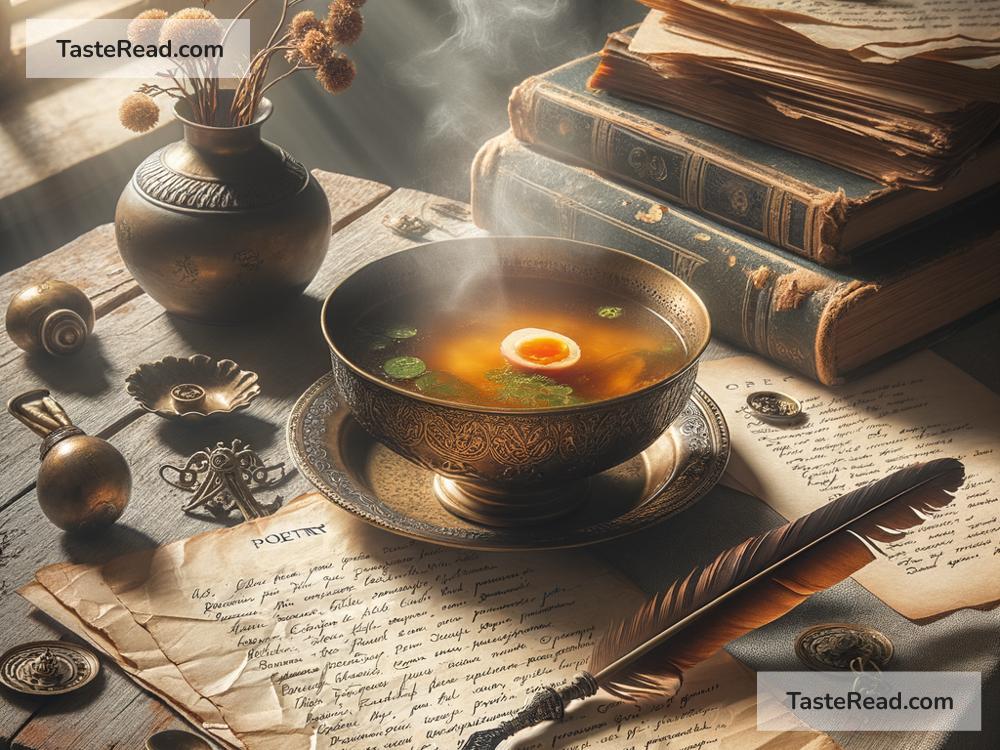The Legend of the Soup That Inspires Poets
In the world of literature and art, inspiration is a mysterious force. Poets, writers, and artists often say their best ideas come from the oddest places—the sound of rain, the flicker of candlelight, or even a cup of tea. But what if there was a secret ingredient, in the form of something warm and comforting, that could spark creativity and turn everyday thoughts into beautiful verses? Some say there is. Welcome to the story of the legendary Soup of Inspiration – a magical broth believed to awaken the inner poet in anyone who tastes it.
The Origins of the Tale
The story of the Soup of Inspiration is rooted in folklore. Many countries have variations of this tale, often told by grandmothers to curious grandchildren. In one version, a humble village chef creates the soup while trying to cure the sadness of poets who had lost their muse. In another tale, the soup comes from ancient sages who lived atop a snowy mountain, sharing their recipe only with those who were true seekers of art and wisdom. While the exact origin is unclear, the message remains the same: the soup is said to be so extraordinary that it can lift the fog over the minds of poets and open doors to a world of creativity.
The Magical Ingredients
What makes this soup so special is not just its taste but a unique combination of elements that are said to trigger inspiration. The recipe has been passed down in whispers, often in riddles that leave people scratching their heads. Some versions say it includes rare herbs grown in moonlight while others describe ingredients as simple as onions, garlic, carrots, and a pinch of salt—but with a twist.
One key ingredient across all the legends is a handful of emotion. The cook must prepare the soup with care, pouring love, hope, and curiosity into every stir of the pot. According to storytellers, this emotional touch transforms an ordinary soup into the magic elixir that fuels creativity.
Some versions add a poetic charm: stirring the soup clockwise while reciting lines of poetry or humming tunes that evoke nostalgia. Together, these traditions turn the cooking process into an act of creation in itself, while also honoring the art the soup is meant to inspire.
Who Ate the Soup?
The legends feature poets, musicians, and storytellers from every corner of history. From wandering bards to court poets who struggled to compose verses for kings, the soup appears at critical moments when these artists face creative blocks. One story mentions an old poet known only by the name “Alfred of the Willow Woods,” who was overcome with grief and unable to write; after tasting the Soup of Inspiration, he created verses so powerful that they united rival kingdoms.
In another tale, a young girl named Lin ventured into the woods searching for wildflowers and stumbled upon an old woman cooking the famed soup. Lin confided her dream of writing poetry but admitted her fear of never being good enough. The old woman offered her the soup, and Lin’s trembling hands scribbled her first lines with ease after taking just one sip.
These stories don’t just glorify the soup—they show the transformative power of belief. Whether the soup itself was magical or not, the act of tasting it gave artists the courage to step forward and let their creativity bloom.
Is the Soup Real?
For centuries, people have wondered if the Soup of Inspiration is real. Some say it exists, hidden in secret recipes guarded by families who pass it down like treasure. Others believe it’s symbolic—a storytelling tradition meant to inspire people to look for magic in the ordinary.
Whatever your take, the idea behind the soup teaches an important lesson: creativity is not always about waiting for sudden brilliance. Sometimes, it’s about taking that first step, even if that step is as simple as cooking a soup, sitting by a window, and opening yourself to the world around you. Many have argued that the soup’s “magic ingredient” isn’t an herb or spice but the belief that inspiration will come to those who welcome it.
The Modern Magic
In our fast-paced world, the Soup of Inspiration reminds us to slow down. Today, some people recreate versions of the legendary soup, hoping it might help them light their creative spark. Writers experiment with making broth while reciting poetry, musicians hum tunes at their kitchen stoves, and everyday dreamers sip soups, imagining themselves as painters, singers, or writers. Whether it’s a real recipe or a myth, the soup continues to inspire generations.
If nothing else, the soup represents the importance of nourishing the body and mind. After all, who doesn’t feel better after holding a warm bowl of soup in their hands? Maybe inspiration isn’t so far away—it might be sitting right there in your kitchen, waiting for you to stir a pot with imagination and intention.
Conclusion
The Legend of the Soup That Inspires Poets is a beautiful reminder that inspiration can come from anywhere, even something as simple as food. Perhaps it’s a real recipe, or maybe it’s just a metaphor for approaching creativity with an open heart and curious mind. Whatever you believe, the story encourages us to look for magic in our daily lives. After all, who knows? The next time you make soup, it just might bring out the poet within you.


